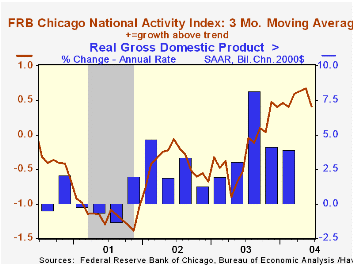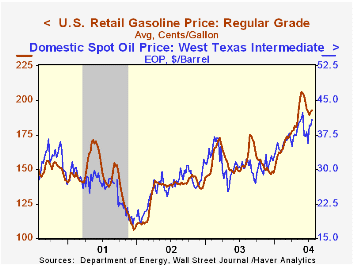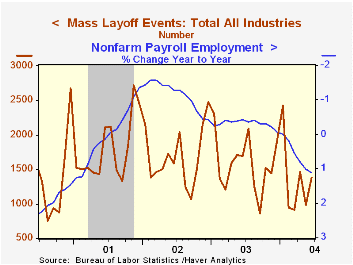 Global| Jul 23 2004
Global| Jul 23 2004Chicago Fed Nat'l Activity Index Backpedaled in June
by:Tom Moeller
|in:Economy in Brief
Summary
The Chicago Fed National Activity Index (CFNAI) fell last month to 0.00 from 0.75 in May. The three-month moving average of the CFNAI similarly dipped to 0.41, the second lowest reading this year. A zero value of the CFNAI indicates [...]

The Chicago Fed National Activity Index (CFNAI) fell last month to 0.00 from 0.75 in May.
The three-month moving average of the CFNAI similarly dipped to 0.41, the second lowest reading this year.
A zero value of the CFNAI indicates that the economy is expanding at its historical trend rate of growth.
During the last twenty years there has been a 75% correlation between the level of the CFNAI and q/q growth in real GDP.
The CFNAI is a weighted average of 85 indicators of economic activity. The indicators reflect activity in the following categories: production and income, the labor market, personal consumption and housing, manufacturing and trade sales, and inventories & orders.
The latest release of the Chicago Fed's National Activity Index is available here.
A recent speech by Fed Vice-Chairman Roger W. Ferguson, Jr. titled "A Retrospective on Business-Cycle Recoveries: Are "Jobless" Recoveries the New Norm?" is available here.
| Chicago Fed | June | May | June '03 | 2003 | 2002 | 2001 |
|---|---|---|---|---|---|---|
| CFNAI | 0.00 | 0.75 | -0.18 | -0.10 | -0.40 | -1.18 |
by Tom Moeller July 23, 2004

The average price for unleaded regular gasoline rose last week to $1.93, the second week of rise following six of decline from the peak of $2.06.
Spot crude oil prices also moved higher with the price of West Texas Intermediate crude at $40.86 last week and $41.46 yesterday.
Wholesale natural gas prices eased somewhat last week to $5.91/mmbtu (+17.0% y/y).
For the latest Short Term Energy Outlook from the US Department of Energy click here.
| Energy Prices | 07/19/04 | 12/31/03 | Y/Y | 2003 | 2002 | 2001 |
|---|---|---|---|---|---|---|
| US Retail Gasoline, Regular ($/Gal.) | $1.93 | $1.48 | 26.5% | $1.56 | $1.35 | $1.42 |
| Domestic Spot Market Price: West Texas Intermediate ($/Barrel) | $40.86 | $32.78 | 35.4% | $32.78 | $31.23 | $19.38 |
by Tom Moeller July 23, 2004

Mass layoffs in the US as reported to the Bureau of Labor Statistics bounced up 39.6% in June and recouped nearly all of the prior month's 32.2% decline.
The number of firms reporting mass layoffs in June rose to 1,379 from 988 in May.
These layoffs generated 134,588 initial claims for unemployment insurance. That was up from 87,501 initial claims generated in May.
Since the series inception in 1995 there has been a (negative) 47% correlation between the number of initial claims generated by mass layoffs and the one month change in non-farm payrolls.
The Mass Layoff Statistics (MLS) program collects reports on mass layoff actions that result in workers being separated from their jobs. Monthly mass layoff numbers are from establishments which have at least 50 initial claims for unemployment insurance (UI) filed against them during a 5-week period. Extended mass layoff numbers (issued quarterly) are from a subset of such establishments--where private sector non-farm employers indicate that 50 or more workers were separated from their jobs for at least 31 days.
| Mass Layoffs | June | May | Y/Y | 2003 | 2002 | 2001 |
|---|---|---|---|---|---|---|
| Number of Events: All Industries | 1,378 | 988 | -18.5% | 18,963 | 20,277 | 21,467 |
| Numbers of Persons Filing Initial Unemployment Insurance Claim: All Industries | 134,588 | 87,501 | -14.6% | 1,888,926 | 2,245,051 | 2,514,862 |
Tom Moeller
AuthorMore in Author Profile »Prior to joining Haver Analytics in 2000, Mr. Moeller worked as the Economist at Chancellor Capital Management from 1985 to 1999. There, he developed comprehensive economic forecasts and interpreted economic data for equity and fixed income portfolio managers. Also at Chancellor, Mr. Moeller worked as an equity analyst and was responsible for researching and rating companies in the economically sensitive automobile and housing industries for investment in Chancellor’s equity portfolio. Prior to joining Chancellor, Mr. Moeller was an Economist at Citibank from 1979 to 1984. He also analyzed pricing behavior in the metals industry for the Council on Wage and Price Stability in Washington, D.C. In 1999, Mr. Moeller received the award for most accurate forecast from the Forecasters' Club of New York. From 1990 to 1992 he was President of the New York Association for Business Economists. Mr. Moeller earned an M.B.A. in Finance from Fordham University, where he graduated in 1987. He holds a Bachelor of Arts in Economics from George Washington University.
More Economy in Brief
 Global| Feb 05 2026
Global| Feb 05 2026Charts of the Week: Balanced Policy, Resilient Data and AI Narratives
by:Andrew Cates






